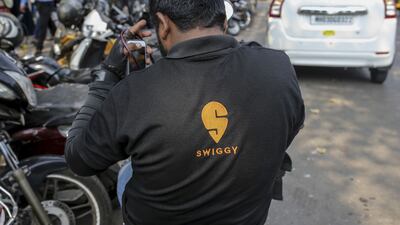Indian food delivery start-up Swiggy raised $1.25 billion in a new funding round led by SoftBank Vision Fund 2 and its existing investors Prosus, Accel Partners and Wellington Management.
The new round, which Swiggy said was “highly oversubscribed”, valued the company at $5.5bn.
Other investors including Qatar Investment Authority, Falcon Edge Capital, Amansa Capital, Goldman Sachs, Think Investments and Carmignac also participated in the round.
Swiggy’s chief executive
The investment will be used to accelerate Swiggy’s “multi-year strategy of growing its core food delivery business” and “building new food and non-food adjacencies”, the start-up said. The funds will also help it to invest in new technologies and strengthen its engineering, supply chain, product and data analytics teams.
Swiggy and other tech start-ups in India are benefitting from a massive influx of funding. Investors are flocking to tap into a digital boom as the country's more than 500 million internet users increasingly turn to online channels amid the Covid-19 pandemic. Earlier this month, Swiggy's rival Zomato launched a $1.3bn initial public offering while Walmart-backed e-commerce company Flipkart raised a record $3.6bn to fuel its expansion.
“The participation of some of the most visionary global investors is a huge vote of confidence … the next 10-15 years offer a once-in-a-lifetime opportunity for companies like Swiggy as the Indian middle class expands and our target segment for convenience grows to 500 million users,” Sriharsha Majety, Swiggy’s chief executive, said.
“Our biggest investments will be in our non-food businesses that has witnessed tremendous consumer love and growth in a short span, especially in the past 15 months of the pandemic.”
Founded in 2014, Swiggy is an on-demand delivery platform that connects consumers to more than 150,000 restaurants and stores in over 500 cities.
In the past year, it has launched many new services to diversify its offerings and to minimise the damage caused by the Covid-19 pandemic. Swiggy's instant grocery delivery service, Instamart, is also growing rapidly, the company said.
chief executive of Prosus Food
The start-up has also expanded its pick-up and drop service, Swiggy Genie, to 65 cities and deepened the presence of its meat delivery service in key markets.
“Swiggy’s focus on evolving the consumer experience and its emphasis on relationships with its delivery partners and restaurants have made it a household brand in India,” Munish Varma, managing partner of SoftBank Investment Advisers, said.
“We are excited to partner with Swiggy as they increase their service offerings and daily consumer touchpoints in the rapidly developing digital economy,” added Mr Varma.
The funding round also marked SoftBank Vision Fund 2's first investment in the Indian food delivery sector.
India's food-tech industry is poised to grow between 25 per cent and 30 per cent annually to reach $8bn by 2023, from $4bn last year, according to a report by Google and Boston Consulting Group. However, competition in the sector is rife, with many food delivery start-ups burning cash to maintain market share and build a loyal customer base.
Amazon also entered the food delivery market in India last year but its operations are currently limited to Bangalore.


